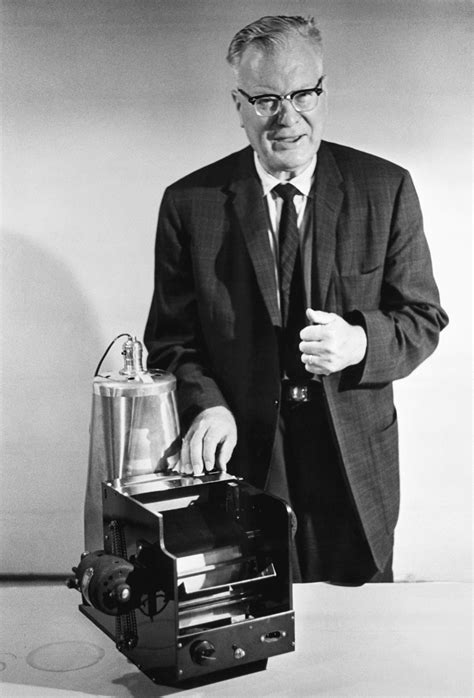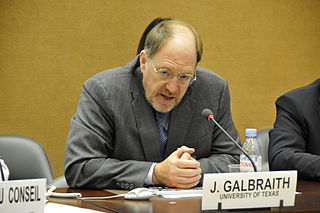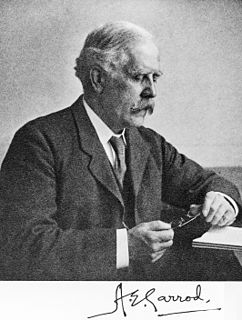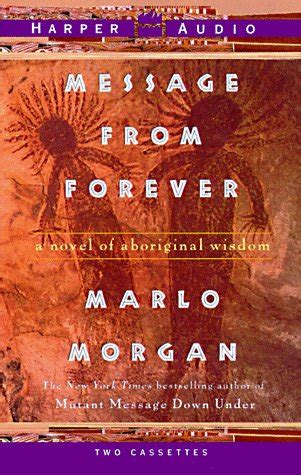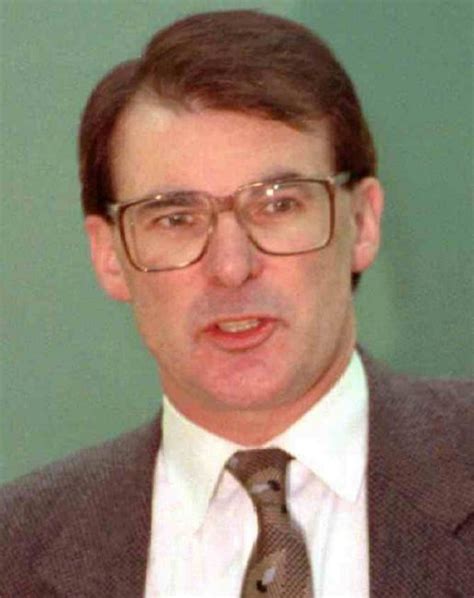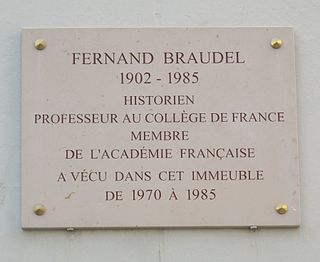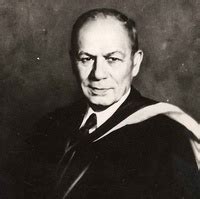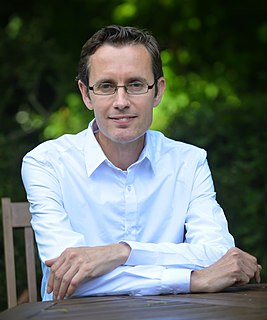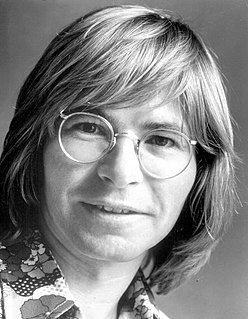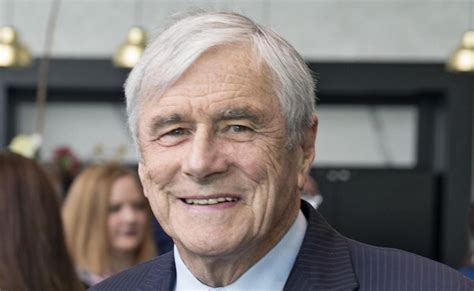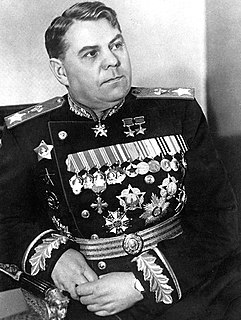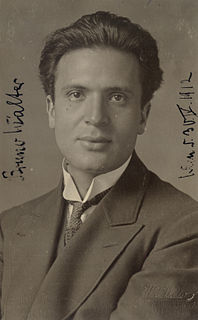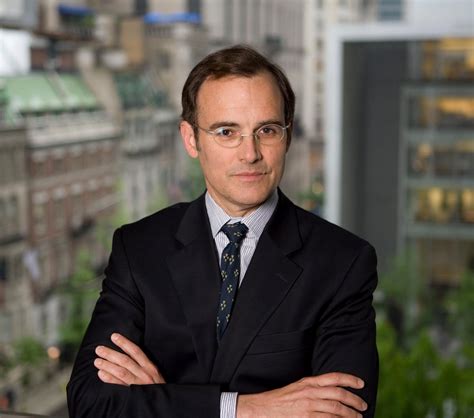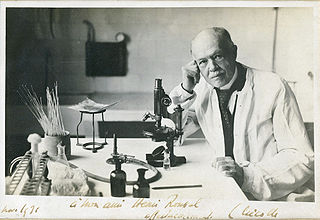Top 1089 Contribution Quotes & Sayings - Page 18
Explore popular Contribution quotes.
Last updated on April 21, 2025.
Work outside of school hours was a necessity at an early age, and with such time as I had I turned toward interests of my own devising, making things, experimenting, and planning for the future. I had read of Thomas Alva Edison and other successful inventors, and the idea of making an invention appealed to me as one of the few available means to accomplish a change in one's economic status, while at the same time bringing to focus my interest in technical things and making it possible to make a contribution to society as well.
I have in this War a burning private grudge — which would probably make me a better soldier at 49 than I was at 22: against that ruddy little ignoramus Adolf Hitler (for the odd thing about demonic inspiration and impetus is that it in no way enhances the purely intellectual stature: it chiefly affects the mere will). Ruining, perverting, misapplying, and making for ever accursed, that noble northern spirit, a supreme contribution to Europe, which I have ever loved, and tried to present in its true light.
The only way to maximize group creativity—to make the whole more than the sum of its parts—is to encourage a candid discussion of mistakes. In part, this is because the acceptance of error reduces cost. When you believe your flaws will be quickly corrected by the group, you're less worried about perfecting your contribution, which leads to a more candid conversation. We can only get it right when we talk about what we got wrong.
I’m not ashamed of what I am - of how I pass through this life. What I am has given me the strength to do it. At my lowest ebb I have never contemplated suicide. I value what is here too much. I have a contribution to make. I am not just take up space in this life. I can add something to the lives I touch. I don’t like everything I know about myself, and I’ll never be satisfied, but nobody’s perfect. I’m not sure where the next years will take me - what they will hold - but I’m open to suggestions.
The idea that each individual has intrinsic, God-given value and is of infinite worth quite apart from any social contribution - an idea most pagans would have rejected as absurd - persists today as the ethical basis of western law and politics. Our secularized western idea of democratic society owes much to that early Christian vision of a new society - a society no longer formed by the natural bonds of family, tribe, or nation but by the voluntary choice of its members.
The so-called Philosophy of India is even more blowsy and senseless than the metaphysics of the West. It is at war with everything we know of the workings of the human mind, and with every sound idea formulated by mankind. If it prevailed in the whole modern world we'd still be in the Thirteenth Century; nay, we'd be back among the Egyptians of the pyramid age. Its only coherent contribution to Western thought has been theosophy-and theosophy is as idiotic as Christian Science. It has absolutely nothing to offer a civilized white man.
An institution which is financed by a budget - or which enjoys a monopoly which the customer cannot escape - is rewarded for what it deserves rather than what it earns. It is paid for 'good intentions' and 'programs'. It is paid for not alienating important constituents rather than satisfying any one group. It is misdirected by the way it is being paid into defining performance and results as what will produce the budget rather than as what will produce contribution.
There have always been two theories about inequality. One is that it reflects just deserts. The other is that there are large elements of exploitation and inequality of opportunities. The evidence is overwhelmingly that the increase in inequality is associated with those negative factors. If it were all social contribution, then when the top did better, they would be contributing to everybody's well-being. That trickle-down hasn't happened. We've seen median income, people in the middle, actually worse off than they were 25 years ago.
Man is sitting disconsolate on an anthill one morning. God asks him what the matter is and man replies that the soil is too swampy for the cultivation of the yams which God has directed him to grow. God tells him to bring in a blacksmith to dry the soil with his bellows. The contribution of humanity to this creation is so important. God could have made the world perfect if he had wanted. But he made it the way it is. So that there is a constant need for us to discuss and cooperate to make it more habitable, so the soil can yield, you see.
Trees are very good friends. Firm friends. My five year olds tree could be relied upon to be there next day, uncritical and protective. And think of trees contribution to our lives. They provide boats, buildings, paper, furniture and, for clog-wearers, footwear. As well as contributing toothpicks and chopsticks they give little birdies somewhere comfy to sit. Best of all, they help produce breathable air and lock up that naughty carbon. Why is why I am talking to the Greens about giving trees the vote.
I can't resist telling you that when the Vienna Economics Institute celebrated its centennial, many years ago, they invited, as their keynote speaker, my father [John Kenneth Galbraith]. The leading economists of the Austrian school- including von Hayek and von Haberler - returned for the occasion. And so my father took a moment to reflect on the economic triumphs of the Austrian Republic since the war, which, he said, "would not have been possible without the contribution of these men." They nodded - briefly - until it dawned on them what he meant. They'd all left the country in the 1930s.
In the end, it is impossible to have a great life unless it is a meaningful life. And it is very difficult to have a meaningful life without meaningful work. Perhaps, then you might gain that great tranquility that comes from knowing that you've had a hand in creating something of intrinsic excellence that makes a contribution. Indeed, you might even gain that deepest of all satisfactions: knowing that your short time on this earth has been well spent, and that it mattered.
Nevertheless, scientific method is not the same as the scientific spirit. The scientific spirit does not rest content with applying that which is already known, but is a restless spirit, ever pressing forward towards the regions of the unknown, and endeavouring to lay under contribution for the special purpose in hand the knowledge acquired in all portions of the wide field of exact science. Lastly, it acts as a check, as well as a stimulus, sifting the value of the evidence, and rejecting that which is worthless, and restraining too eager flights of the imagination and too hasty conclusions.
Over the last few decades, I've grown more skeptical about a few things in which I used to have more faith. I believe as much in the necessity of, and the possibility of, revolution as I ever did. At the same time, I've grown more skeptical about poetry's role in it or art's contribution to it, and I've grown more skeptical about the university. Universities are big companies, and they're disciplinary in the way that any big institution is. I've found that the political militancy that the professoriate has mostly been fairly repressive of what I take to be necessary politics.
Samadhi is the journey from individual to collective consciousness. The steps of Samadhi are the steps towards reaching the collective consciousness. In meditation, the more we radiate love, compassion, peace, harmony and tranquility, the more is our contribution towards the collective consciousness. The more we positively contribute towards the collective consciousness the more is our progress in Samadhi.
The Sappers really need no tribute from me; their reward lies in the glory of their achievement. The more science intervenes in warfare, the more will be the need for engineers in field armies; in the late war there were never enough Sappers at any time. Their special tasks involved the upkeep and repair of communications; roads, bridges, railways, canals, mine sweeping. The Sappers rose to great heights in World War II and their contribution to victory was beyond all calculations.
Intersectionality has made an important contribution to social and political analysis, asking all of us to think about what assumptions of race and class we make when we speak about "women" or what assumptions of gender and race we make when we speak about "class." It allows us to unpack those categories and see the various kinds of social formations and power relations that constitute those categories.
My job, as an actor, is to entertain people. My contribution to society is to be a respite from everyday life. People go home and watch television or they go to the movies, and they get to escape their reality. But if I can do entertainment that also maybe can educate people, educate myself, move people's hearts and minds, in some way, and bring light to some injustice, that's when entertainment is at its best. And if somebody wants to get more involved in a socially active way, that's when you've done the thing that I've always wanted to be a part of.
We had very good discussions on current security challenges and NATO's continued adaptation to meet them. Canada is a committed ally and a capable contributor to international security. We appreciate your quick decision to deploy forces, planes and ships to strengthen our collective defence in view of Russia's aggressive actions in Ukraine, as well as your contribution to the international anti-ISIL coalition. Canada plays a major part in our decision-making and helps keep the vital bond between Europe and North America strong.
During our journey there were two occasions that we celebrated by honoring someone's talent. Everyone is recognized by a special party, but it has nothing to do with age or birthdate - it is in recognition of uniqueness and contribution to life. They believe that the purpose for the passage of time is to allow a person to become better, wiser, to express more and more of one's beingness. So if you are a better person this year than last, and only you know that for certain, then you call for a party. When you say you are ready, everyone honors that.
If the Europeans truly wish to improve their NATO contribution they can show it simply enough. They can establish professional armed forces, like those of the UK. And they can acquire more advanced technology. Indeed, unless that happens soon the gulf between the European and US capabilities will yawn so wide that it will not be possible to share the same battlefield. Alas, I do not think that sharing battlefields with our American friends - but rather disputing global primacy with them - is what European defence plans are truly about.
If you are self-motivated, wow, this world is tailored for you. The boundaries are all gone. But if you're not self-motivated, this world will be a challenge because the walls, ceilings and floors that protected people are also disappearing. That is what I mean when I say "it is a 401(k) world." Government will do less for you. Companies will do less for you. Unions can do less for you. There will be fewer limits, but also fewer guarantees. Your specific contribution will define your specific benefits much more. Just showing up will not cut it.
How does humility manifest itself in leadership and in life? A humble person is more concerned about what is right than about being right, about acting on good ideas than having the ideas, about embracing new truth than defending outdated position, about building the team than exalting self, about recognizing contribution than being recognized for making it.
Half of one per cent of the U.S. budget is space-related stuff. In Canada, we spend more on dog foodScreen Shot 2015-08-19 at 2.39.35 PM. Space flight is intrinsically international and very modern. It's like a co-op. Every country provides services. In Canada, we have a focus on robotics in the shuttle and space station. In exchange, we get research time for our scientists and astronauts' flights. Our contribution is as a junior partner.
I hope corporations will dedicate a percentage of their top innovators' time to issues that could help people left out of the global economy. This kind of contribution is even more powerful than giving cash or offering employees' time off to volunteer. It is a focused use of what your company does best. It is a great form of creative capitalism, because it takes the brainpower and makes life better for the richest, and dedicates some of it to improving the lives of everyone else.
Judo has been part of Japanese culture for a long time. It makes sense to me that this sport, which is both athletic and philosophical, was created in Japan. It is based on respect for the partner and for our elders as our teachers, which is very important and makes a strong, positive contribution to human relationships, and not only in sports. I am happy that life brought me to this wonderful sport as a child. It is like my first love.
As for the ethics, law, and politics relationship, there has always been a tension for me as I try to keep them distinct while recognizing their interactions. A valuable contribution to my thinking there and elsewhere was Ellen Meiksins Wood's Mind and Politics, which reinforced for me the ways in which seemingly disparate philosophical endeavors were/are interconnected, and although I have tended to give a certain priority to ethical considerations as part of practical reasoning, I am reminded often enough that this position makes some contentious presumptions .
Funnily enough we have never had one enquiry for Paul Scholes. You know why? Because they all know he will never leave. in my time he would be in the top six or seven (best United players ever) without a doubt. His contribution and quality have been great, even without the fantastic goals he has scored. [ . . . ] He has that wonderful velvet touch on the ball. When he gets it, it goes stone dead. It is wonderful to see that amidst all the mayhem that can happen in a football match.
Regardless of the extent to which the media promote "politically correct," but scientifically wrong, resolutions from professional societies such as the American Anthropological Association, facts remain facts and require appropriate scientific, not political or ideological, explanation. None of this should be construed as meaning that environmental factors play no part in individual and group differences. But with each passing year and each new study, the evidence for the genetic contribution to these differences becomes more firmly established than ever.
I heard today was the day Kurt passed away 17 years ago. Can’t believe it’s been that long. So grateful for his contribution and inspiration. Not sure I’d be doing this if it weren’t for him. He gave us all permission to create no matter what our skill set and reminded me that dreams are possible. Thanks for that. This made me recall a short piece of film I shot when I heard they were making a film celebrating his life. I made it to explore the character and explore creative possibilities. I never sent it to the studio or to anyone but thought I’d share it now...
Focusing-Oriented Art Therapy is a major contribution to art therapy literature and practice. Laury Rappaport introduces a contemplative method and philosophy grounded in the body's felt-sense of experience and its innate and largely unrecognized wisdom. This intellectually provocative, yet thoroughly practical text, establishes Rappaport as an emergent leader in the art therapy world and author of a book that every student and art therapist must read in order to appreciate the depth and breadth of our discipline.
Zen's greatest contribution is to give you an alternative to the serious man. The serious man has made the world, the serious man has made all the religions. He has created all the philosophies, all the cultures, all the moralities; everything that exists around you is a creation of the serious man. Zen has dropped out of the serious world. It has created a world of its own which is very playful, full of laughter, where even great masters behave like children.
Events are the ephemera of history; they pass across its stage like fireflies, hardly glimpsed before they settle back into darkness and as often as not into oblivion. Every event, however brief, has to be sure a contribution to make, lights up some dark corner or even some wide vista of history. Nor is it only political history which benefits most, for every historical landscape - political, economic, social, even geographical - is illumined by the intermittent flare of the event.
The motion picture is like a picture of a lady in a half-piece bathing suit. If she wore a few more clothes, you might be intrigued. If she wore no clothes at all, you might be shocked. But the way it is, you are occupied with noticing that her knees are too bony and that her toenails are too large. The modern film tries too hard to be real. Its techniques of illusion are so perfect that it requires no contribution from the audience but a mouthful of popcorn.
Gass once wrote: "Language serves not only to express thought but to make possible thoughts which could not exist without it." Here is the essence of mankind's creative genius: not the edifices of civilization nor the bang-flash weapons which can end it, but the words which fertilize new concepts like spermatozoa attacking an ovum. It might be argued that the Siamese twin infants of word/idea are the only contribution the human species can, will, or should make to the raveling cosmos.
During all the first part of the Middle Ages, no other people made as important a contribution to human progress as did the Arabs, if we take this term to mean all those whose mother-tongue was Arabic, and not merely those living in the Arabian peninsula. For centuries, Arabic was the language of learning, culture and intellectual progress for the whole of the civilized world with the exception of the Far East. From the IXth to the XIIth century there were more philosophical, medical, historical, religiuos, astronomical and geographical works written in Arabic than in any other human tongue.
About one month before he was killed, when asked by David Frost how his obituary should read: Something about the fact that I made some contribution to either my country, or those who were less well off. I think back to what Camus wrote about the fact that perhaps this world is a world in which children suffer, but we can lessen the number of suffering children, and if you do not do this, then who will do this? I'd like to feel that I'd done something to lessen that suffering.
Machines help us do things more quickly and efficiently, but they can also destroy some community activities. Machines can also throw the weakest people out of work and this would be sad, because their small contribution to the housework or cooking is their way of giving something to the community. People who are capable of doing things very quickly with the help of machines become tremendously busy, always active, in charge of everyone - a bit like machines themselves.
People race to achieve everything by a certain age in their life, be it 40, 50 or 60 - but with increasing life spans 50 or 60 might be just the beginning of a new career, or just the point when you begin to get into your stride. There used to be a syndrome of me retiring at 65 and then dying not long after because their life was stripped of meaning, without their work. But these days you may live another 20 or 30 years beyond 65 so you have to figure out where you can make another contribution.
I suppose that's a question most often asked of me by people who would like to make a positive contribution towards a sustainable future and a healthy environment. There are so many things that need to be done that sometimes it seems overwhelming. I try to remind everyone that no one person has to do it all but if each one of us follows our heart and our own inclinations we will find the small things that we can do, and together we will come up with enough to create a sustainable future and a healthy environment.
When all this is over, people will try to blame the Germans alone, and the Germans will try to blame the Nazis alone, and the Nazis will try to blame Hitler alone. They will make him bear the sins of the world. But it's not true. You suspected what was happening, and so did I. It was already too late over a year ago. I caused a reporter to lose his job because you told me to. He was deported. The day I did that I made my little contribution to civilization, the only one that matters.
The only way of making money is for effort. The only time I've ever lost money is when I've purposely said, "I'm doing this to make money." And I've actually on three occasions lost significant sums. I have made wealth when I've actually made a contribution to something, when I've done something I thought I could do better than somebody else or have done something better than somebody else does it.
The genuinely significant creation, whether an idea, or a work of art, or a scientific discovery, is most likely to be seen at first as erroneous, bad, or foolish. Later it may be seen as obvious, something self-evident to all. Only still later does it receive its final evaluation as a creative contribution. It seems clear no contemporary mortal can satisfactorily evaluate a creative product at the time it is formed, and this statement is increasingly true the greater the novelty of the creation.
It's a fact of life that how you dress affects how you are perceived and whether your contribution to a meeting is registered as worth listening to. It was most alarming the way people's attitudes changed when I started wearing my designer suits to committee meetings. Obviously, it's not just the clothes that count; you have got to have something worth saying. But it si true that some people's views are dismissed before they speak because others perceive them as just a secretary!
Others have questions about how it is that God and human beings can both be speaking through the one document such that you can see and read the personalities of the human authors with their individual vocabularies and literary genres, and yet this is nevertheless the word of God. How can that be? This is quite a contrast with Islam, for example, which holds that the Koran has been dictated in Arabic by God and as a result Mohammed is nothing more than the one who memorizes the word so as to pass it on. There is nothing of human contribution.
Conditions to the north of us, in the Voronezh and Steppe Fronts zone of action, and our offensive on Kharkov demands that we not lose time and we commit all forces so that we can draw off as many divisions as possible from Kharkov. And even if we do not draw them off, at least we will not give Manstein the ability to take any of his units from our part of the front. If we attract one or two German tank divisions - it will be the best contribution to the defeat of the enemy in the south.
There is no task of greater importance than to give our children the very best preparation for the demands of an ominous future, a preparation which aims at the methodical cultivation of their spiritual and their moral gifts. As long as the exemplary work of the Waldorf School Movement continues to spread its influence as it has done over the past decades, we can all look forward with hope. I am sure that Rudolf Steiner’s work for children must be considered a central contribution to the twentieth century and I feel it deserves the support of all freedom-loving thinking people.
"Biblical theology" refers to something more precise than theology that is faithful to the Bible. It might be helpful to draw a contrast: at the risk of oversimplification, systematic theology tends to organize theology topically and with an eye cast on its contemporary relevance, while biblical theology tends to organize the same biblical material so that it is easier to see the distinctive contribution of each biblical book and human author, and to trace the trajectories of themes across the Bible so we see how the books of the Bible hold together.
De-Christianizing America has been high on the progressive agenda, and, thanks to the government (especially the federal courts), it has been a great success. Nor can we overlook the contribution of the entertainment industry, which now determines what passes for 'culture.' The main practical vehicle of de-Christianization has been the Sexual Revolution. A few radicals have called for the abolition of the family, but most liberals have been more discreet, avoiding hostile rhetoric while quietly but constantly pursuing policies that result in lower birthrates and fatherless children.
James Russell offers a timely and compelling blueprint for a realistic transformation of America's energy consumption by refusing to fall victim to conventional thinking. Accessible?pragmatic even?Russell's proposals speak to goals on the immediate horizon and underscore the role that intelligent design can play now in America. On a longer horizon, his analysis points to a range of issues about land use, transportation, and coordination of public and private investments to which the design professions have an enormous contribution to make. Here design and policy find common ground.
The classics of Marxism talked of communism as a society to which a modern society should aspire, a society truly fair, where the relations of monetary exchange were not the priority but one wher the people's needs could be satisfied, and where people would not be worth more according to how much monetary wealth they acquired. Instead their value would be based on their contribution to society as a whole. It would be a society without class that would accept people based on their capabilities and their potential to contribute to that society.
The money men make from their willingness to work the least desirable hours is not a sign of discrimination against women, but a sign of the willingness of mostly married men to lose sleep to support the family as their wife loses sleep to feed the child. A willingness to do the uncomfortable shifts is one reason married men earn more than twice what never-married men earn. Men's contribution, made at night, need not be lost in the dark.
I have never had illusions about the value of my individual contribution! I realized early that what a man or a woman does is built on what those who have gone before have done, that its real value depends on making the matter in hand a little clearer, a little sounder for those who come after. Nobody begins or ends anything. Each person is a link, weak or strong, in an endless chain. One of our gravest mistakes is persuading ourselves that nobody has passed this way before.
Service is the measure of greatness; it always has been true; it is true today, and it always will be true, that he is greatest who does the most of good. Nearly all of our controversies and combats grow out of the fact that we are trying to get something from each other--there will be peace when our aim is to do something for each other. The human measure of a human life is its income; the divine measure of a life is its outgo, its overflow--its contribution to the welfare of all.
I often ask myself: "What would Theodore Roosevelt do?" One can never know, of course. The ultimate contribution of consequential leaders is often their capacity to reframe issues in novel ways. That said, his leadership engaged, at a foundational level, whether the American "national character" would accept decline and mediocrity, or would go all-in for leadership and excellence. Amid the myriad of otherwise disconnected issues before us, that choice is emerging yet again.
Every time I traveled to a new city, I would learn about local heroes I did not know about, and I would learn about their very impressive contribution to their cities. There are nuanced senses that only people from the region can understand, and no amount of globalization can change that. It's almost like a maxim of a sorts, when you think about language, the way that people speak in a location. It does happen with architects, in terms of how they engage cities.
And this is the ultimate lesson that our knowledge of the mode of transmission of typhus has taught us: Man carries on his skin a parasite, the louse. Civilization rids him of it. Should man regress, should he allow himself to resemble a primitive beast, the louse begins to multiply again and treats man as he deserves, as a brute beast. This conclusion would have endeared itself to the warm heart of Alfred Nobel. My contribution to it makes me feel less unworthy of the honour which you have conferred upon me in his name.
What is emotional intimacy? It is that depp sense of being connected to one another. It is feeling loved, respected and appreciated, while at the same time seeking to reciprocate. To feel loved is to have the sense that the other person genuinely cares about your well-being. Respect has to do with feeling that your potential spouse has positive regard for your personhood, intellect, abilities and personality. Appreciation is that inner sense that your partner values your contribution to the relationship.
The ways in which management can express appreciation for an employee's contribution are without end; the key is to act in ways that communicate Thanks! That was a great job! We can really count on you! It's great having you here! While some people love having plaques to hang on their personal Wall of Fame and they adore being acknowledged at a formal Recognition Banquet and some people are only interested in money, I find the most effective forms of recognition are personal and either spontaneous or very close in time to a significant accomplishment.
